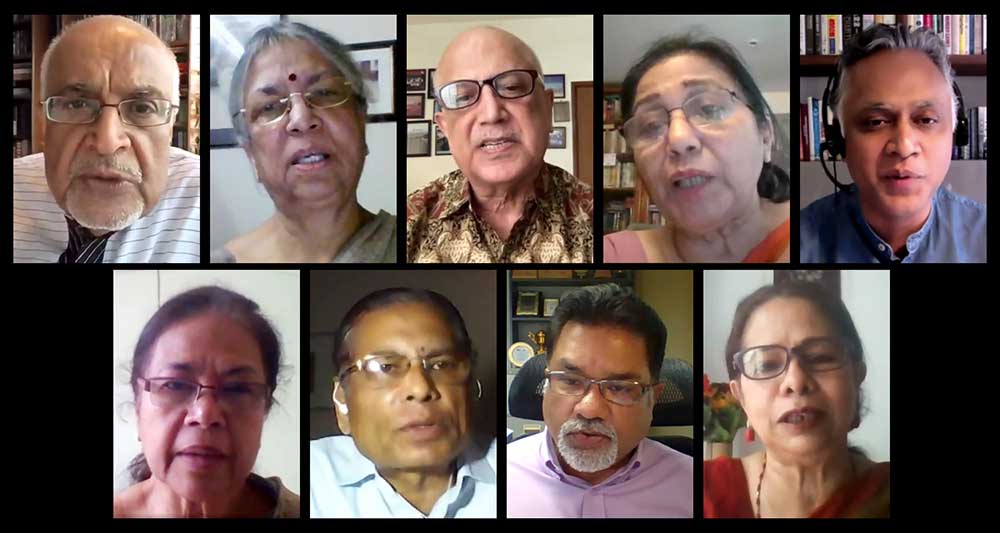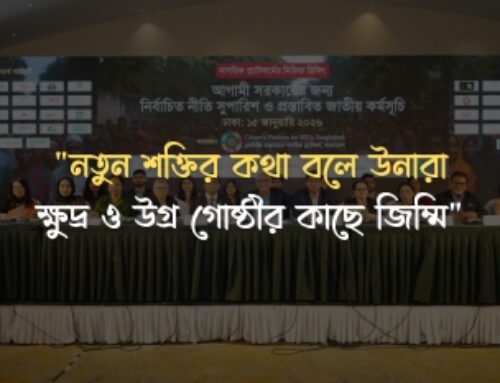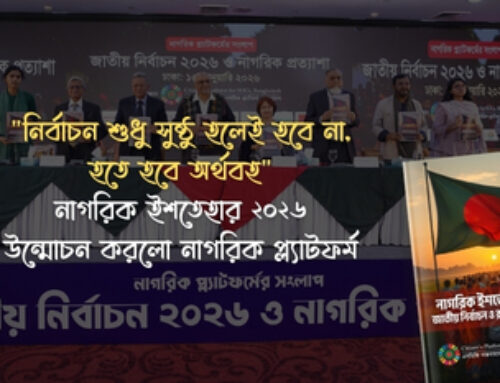The ongoing pandemic has, undoubtably, adversely impacted every citizen of Bangladesh. However, this impact is disproportionately higher among the marginalised and disadvantaged communities. As such, specific and rightly directed policies need to be implemented for these vulnerable groups. Employment being restored with low skills and low-income jobs, extensive under-employment, growing indebtedness and deepening inequality have been on the rise during the second wave. Budgetary targets have not been realized on both the resource and expenditure sides. Apparent stability of the macroeconomic situation is also needed in terms of low inflation, stable exchange rate, moderate fiscal deficit and current account surplus.
In this backdrop, Citizen’s Platform for SDGs Bangladesh has proposed a fiscal budgetary framework with a number of strategic priorities and COVID stimulus packages, keeping in the purview the upcoming FY2021-22 budget in its virtual media briefing on National Budget for 2021-22: What should be there for the “disadvantaged people”, held on 09 May 2021.

The disproportionate socio-economic impact on traditionally marginalised communities (“left behind”) as well as on low income and low middle-income people (“pushed behind”) will be more protracted than the immediate health emergencies. Current circumstances demand special attention to consumption protection of the poor/low-income people and employment promotion at the MSME level.
To initiate the midterm approach of FY2021-22 we need to press all four triggers: (i) consumption, (ii) investment, (iii) government spending and (iv) net exports. A minimum two-three year time frame to have a robust recovery strategy with core budget, integrating recovery efforts with structural transformation needs, targeted discretionary support to the “left behind” and “push behind” communities/citizens and use SDG as a framework for poverty frame and align with 8FYP (2021-25) is critically important.
Until March FY2021, revenue collection was 50 per cent of the target with 7.3(+) per cent growth and ADP expenditure was 42 per cent of total allocation with 4.3(-) per cent growth. Financing budget deficit were seen due to low use of foreign concessional finance, high borrowing from the banking sector and costly borrowing through NSC needs to be retrained. Use of concessional foreign finance to be prioritised to improve ADP implementation as well as to keep budget deficit from increasing.
The disadvantaged population of the country bear the disproportionate adverse impact of such shortfall in public development programme. Last year (2020) we were concerned about resource availability (lack of fiscal space) to confront the pandemic. This year (2021) we can say it is the inability to implement the public expenditure programmes which has become the binding constraint. We also need to create an integrated data base of potential recipients of government supports including social safety nets and to improve the quality of the public expenditures, involvement of stakeholders at different levels are required.
In FY 2020, before July 2020, total Tk 77,278 crore (2.76% of GDP) stimulus was announced. In FY2021, till May 2021, the amount was roughly Tk 47,715.50 crore (1.71% of GDP). To have greater fiscal multiplier effect, we need to push resources to those having a high marginal propensity to consume (e.g., poorer households) and a high marginal propensity to invest (e.g., small entrepreneurs). Substantive cash transfer to disadvantaged communities/citizens, liquidity flow to MSME, domestic market-oriented manufacturing diversification, post-harvest mechanisation of agriculture, IT-platform based high value service provision etc are some strategic priorities for the FY2021-22 budget.
In Covid related Government support intervention, there were 14 fiscal support (including two food support) and this was less than 20.5% of total allocation. 11 hybrid support (subsidy to interest rate) amounting a little above 79.5% of total allocation where 18 are new interventions and 7 were extension of the existing program. Hybrid support in FY2020-21 includes additional Tk 10,000 crore in Working Capital loans to affected large industries and service sector. Some packages were announced in one fiscal year, but intended to disburse from following fiscal year fully or partly. The estimated net fiscal support (Net fiscal support excludes fiscal support for agriculture sector and construction of home) is as low as 1.63 per cent and 15.54 per cent of total allocations in FY20 and FY21 respectively. In terms of share of GDP, they are 0.04 per cent and 0.19 per cent respectively. Fiscal support was not only low in allocation, but also slower in delivery. This overwhelming constraint cannot be addressed exclusively through strengthened administrative monitoring. This will need wide-ranging structural and institutional reforms.
Dr Debapriya Bhattacharya, Convenor, Citizen’s Platform for SDGs, Bangladesh and Distinguished Fellow, Centre for Policy Dialogue (CPD), made the keynote presentation at the media briefing. The event began with introductory remarks by Anisatul Fatema Yousuf, Coordinator, Citizen’s Platform for SDGs, Bangladesh and Chaired by Advocate Sultana Kamal, Former Executive Director, Ain o Salish Kendra. Professor Mustafizur Rahman, Distinguished Fellow, CPD and other members of the platform, including Shaheen Anam, Executive Director, Manusher Jonno Foundation; Rasheda K Choudhury, Executive Director, Campaign for Popular Education (CAMPE); Dr Mushtaque Raza Chowdhury, Vice Chairperson, BRAC; Asif Ibrahim, Chairman, Business Initiative Leading Development (BUILD) & Syed Nasim Manzur, Chairman of Landmark Footwear Ltd and Founding Director, Apex Footwear Ltd, were also present at the event and shared their views through responding to questions from the media.




